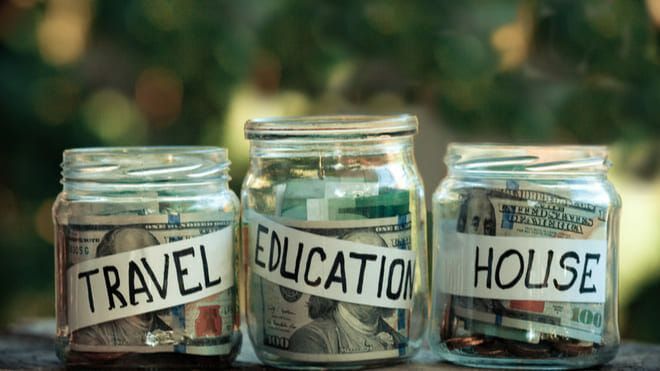I understand that the idea of saving is not the most exciting thing in the world. 🥱
But saving is important. That’s the difference between paying for an amazing vacation with the money you have and putting it on a credit card… to get paid. eventually.
Source: Giphy.com
It’s the difference between paying for unexpected car repairs, no problem, and begging your father for another loan.
Prioritizing savings as soon as possible is critical to a healthy financial life. But with your checking account, your new workplace retirement account, and that huge jar of coins you’ve hidden in your closet, you’re probably wondering where the best place to put your savings is.
Spoiler alert: it’s not a giant piggy bank.
You probably have some sort of traditional savings account that could be a great option for storing those funds. But savings accounts aren’t the only place to keep money. In fact, depending on your goals and preferences, there may be a better option for you.
In this article, we will delve into comparing money market vs. savings accounts – what they are, how they work, and which one is best for you.
A Brief Overview of the Money Market and Savings Accounts
To be clear, money market accounts and savings accounts are safe and secure places to keep your money. None of them will replace a checking account – these accounts are designed to saving, don’t spend – but like a checking account, you can open one with a bank or credit union.
Here are the basics for each:
- A savings account is a deposit account that earns a small interest rate and can be linked to your checking account.
- A money market account is a deposit account that is similar to a savings account but also has some of the typical features of a checking account.
- Money market accounts and savings accounts can serve similar purposes, such as holding emergency and short-term savings.
- Money market accounts and savings accounts are generally low-risk places to store your money, but they limit the number of transactions you can make each month.
- Money market accounts generally have a higher savings rate (APY) and minimum balance requirements than savings accounts.
What is a money market account?
If a checking account and a savings account fell in love and had a baby 👶, it would be a money market account. In other words, a money market account is like a hybrid between a checking account and a savings account.
Money market accounts earn interest and can be limited to six withdrawals per month – just like savings accounts – but they also have a debit card and checks, just like a checking account.
Read more: Best Money Market Accounts
Money Market Accounts: Pros and Cons
Pros: higher interest
Money market accounts usually carry a higher interest rate than traditional savings and checking accounts.
However, you should do some research if you are looking for the best interest rates because money market interest rates may not be as high as some other deposit accounts. But overall, you can expect to earn more than you would with a traditional savings account.
Pros: availability
Money market accounts are more accessible or liquid than traditional savings accounts. This is because some money market accounts include checks and a debit card, two features usually only reserved for checking accounts.
Availability can be helpful when you have an emergency and need to access your savings immediately. (But don’t be tempted to use your savings as spending money just because it’s easy.)
Pros: low risk
Money market accounts are considered low-risk accounts. They are insured for up to $250,000 (FDIC in banks and NCUA in credit unions). This means that your money is always safe and you will get it back if the bank fails for some reason.
Cons: high minimum balance
Money market accounts tend to have higher minimum balance requirements than savings accounts – some of them reach several thousand dollars. You may be required to meet this minimum to open an account or earn the advertised APY.
This should be the main consideration when you are thinking about opening a money market account. There’s less reason to open one if you don’t benefit from a decent interest rate.
Cons: limited withdrawals
One of the reasons you get the best interest rate on your money market account is because there has historically been a limit on how many withdrawals you can make each month. Regulation D, a Federal Reserve regulation, limited the number of withdrawals from both savings and money market accounts to six per month—that is, until 2020.
While this regulation is no longer in effect, many banks and credit unions still enforce the restriction. Depending on your bank, there may be ways to bypass the limit using certain types of transactions (for example, using an ATM or a bank teller).
When should I use a money market account?
You should consider opening a money market account if you want to earn interest on your savings. as well as be able to access it with a debit card or checks if you need to. You must also be sure that you can meet any minimum balance requirements that may be set on your account.
You should also consider how soon you will need access to your money. Money market accounts are ideal for short to medium term purposes such as a sinking fund or reserve fund. But if you’re trying to save for retirement, you’d be better off investing that money.
Read more: Sinking Funds: Budgeting’s Best-Kept Secret
Money market bills vs CDs
If you’ve spent any time researching the different options for savings instruments, you’ve probably heard of CDs. A CD, also known as a certificate of deposit, can serve the same purpose as a money market account. But it has several important differences.
Most importantly, CDs are less liquid. When you deposit money into a CD, you agree not to touch it for a certain period of time. In return, you usually get a higher interest rate.
CDs work well when you know you won’t need that money for a while. They are not a smart choice for short-term savings and an emergency fund because they “lock” your money for a certain period of time.
Read more: Best CD prices, updated daily
Money market accounts and money market mutual funds
There is an important difference between the money market Accounts compared to the money market mutual fundsso don’t confuse them.
Money market mutual funds generally have higher returns because they are considered investments. When it comes to investments, money market mutual funds are low risk, but they don’t have FDIC insurance like a money market account does.
Instead of opening an account with a bank or credit union, you open a money market fund with a brokerage or investment firm.
What is a savings account?
A savings account is a type of deposit account similar to a money market account. Typically, a bank or credit union will pay interest on your savings account and limit the number of withdrawals you can make each month. You can link your savings to a current account and make transfers between them.
Traditional savings accounts generally don’t earn much in terms of interest. However, online banks are becoming more popular due to their ability to offer higher interest rates on savings accounts. This is due to their lower overhead due to the lack of fixed locations.
Savings accounts: pros and cons
Pros: security
Savings accounts – whether in a traditional bank, credit union or online banking – are insured and safe. They provide the peace of mind you need for things like your emergency fund or short-term savings goals.
Pros: availability
Savings accounts are a good place for funds that you want to access in the short to medium term. Again, your bank will likely limit the number of withdrawals and transfers you can make each month. But since your savings is just… saving – in any case, you do not need to refer to it too often.
Pro: lower minimum balance requirements
Savings accounts may have lower minimum requirements than money market accounts, in part because they offer lower interest rates. Most online banks allow you to open an account for as little as $0 – compared to several thousand for many money market accounts.
Cons: No checks or debit card
Unlike a money market account, savings accounts do not have checks or debit cards. This can add an extra step when it comes time to access your money. (You may have to transfer it to your checking account – then use your debit card or withdraw money from the bank).
Cons: Generally lower interest rates
Savings accounts usually have lower interest rates than money market accounts. With many traditional savings accounts, the interest you earn is next to nothing.
When should I use a savings account?
A savings account can be a good idea when you want a safe place to store your money but don’t have enough funds to cover the minimum money market account balance.
Short-term savings goals, such as creating an emergency fund or saving for a vacation, are often good reasons to use a savings account.
If you choose to use a savings account, choose a high-yield online bank account. They generally have lower commissions and higher interest rates.
Read more: Comparison of the best high yield savings accounts
Money market or savings account – which is better for you?
In general, both the money market and savings accounts are good for short to medium term savings. Money market accounts typically earn more interest and offer more flexibility, as well as some of the same convenience features as a checking account.
However, a savings account makes more sense if you can’t reach the minimum balance required to earn a decent interest rate with a money market account.
If you’re the type who struggles to leave your savings alone, a savings account might be better for you. Since money in a savings account isn’t available with checks and debit cards, it’s easier to leave it untouched.
bottom line
Savings and money market accounts are good options for holding your savings, but a money market account gives you more ways to access your money and may have higher minimum balance requirements.
If you’re leaning towards opening a savings account or investing your money in a money market account, take the time to shop around so you know what to expect when it comes to account rates, fees, and limits.
Featured image: smile23/Shutterstock.com


